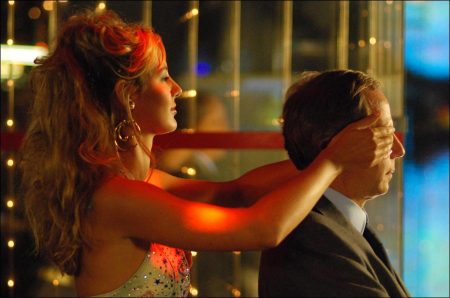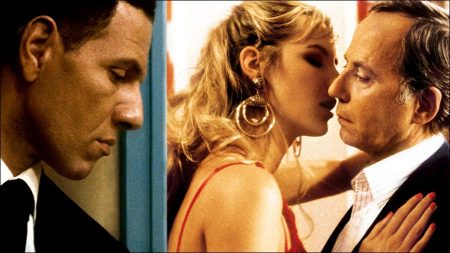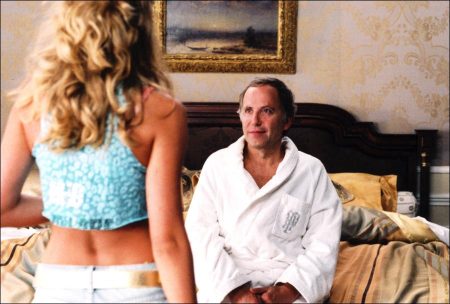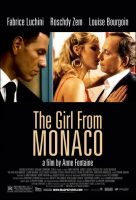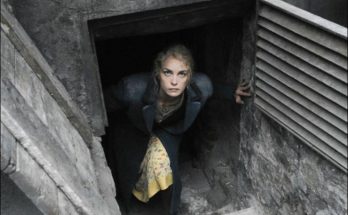Interview with Anne Fontaine
How did the project for The Girl from Monaco begin?
The Girl From Monaco Movie Trailer. I began by conceiving a character who is under the impression, like many others, that he controls his life. He is a lawyer whose only weapon of defense -and attack-are words. What interested me, was to create a character for whom eroticism transits through language.
But this character also emerged from my encounter with Fabrice Lucchini. We’ve known each other for a long time, ever since I directed him in 1985-86 in “Voyage au bout de la nuit.” I was always intrigued by his singularity, his whimsical nature and his great vulnerability. In the end, my perception of him nourished the construction of the character.
How did you make him evolve?
I asked myself what was his relationship to sexuality and to affection. Bertrand is an eternal bachelor whose emotional past we don’t really know. On the other hand, we discover rather quickly that he’s some kind of predator who abandons the preys he seduces when the time comes to do the deed. This form of escape in fact reveals his fear of loosing his bearings.
If only he allowed himself to fall in love and to give himself to another, he would probably discover of a part of himself he confusedly dreads. I wanted to examine what was happening behind this sophisticated front and beneath which hides a man who resists when he is about to abandon himself. And yet, you could think that at his age, he should have nothing to loose: why not allow himself to let go and enjoy pleasure. I was interested in this line of questioning.
This is where Roschdy Zem’s character comes in.
Yes. Because I told myself the lawyer needed a “tutor.” I wanted to oppose to Bertrand a character whose relationship to libido was much simpler and for whom simply questioning himself represents an unnecessary psychic fatigue. He is someone who is very smooth in appearance, but we quickly come to understand that he was forced to learn how to dominate himself by practicing martial arts. I saw him as some kind of companion and guide for Bertrand. But I wanted to address all of this with a comedy angle: it was necessary for the intellectual portrayed by Luchini and the body guard performed by Roschdy Zem to be completely opposite from one another from the very beginning in order to create, little by little, an almost fusion like relationship.
That’s true. We don’t suspect at the beginning that they will develop a friendship…
Out of all of my films, they are probably the characters who are the most hermetical from one another. A priori, nothing predisposes them to get closer-if not for the fact that they complement each other physically: that granite-like presence scares Bertrand a little, and reassures him at the same time. The bodyguard very quickly takes ownership of the lawyer’s inability to do the deed, like in the scene with Jeanne Balibar. In fact, before getting to the relationship with Audrey, I worked with the neo-conjugal couple formed by Bertrand and Christophe. I told myself there was something both ambiguous and whimsical in this unexpected tandem.
There is almost a game of sado-masochistic domination between them…
Indeed, this man who is at the service of another takes his mission so seriously that he will invest himself completely into his “master’s” life. While Bertrand seems to loose himself in his relationship with Audrey, Christophe will progressively takes things into his own hands. What interested me was the transgression of this bodyguard who feels like he is responsible for the lawyer’s emotional destiny.
On the one hand, Christophe admires Bertrand, but on the other, Bertrand allows his bodyguard to occupy a very unusual position in this type of relationship, one that will make everything topple over…it is thanks to Christophe’s intrinsic strength that Bertrand takes so many emotional and psychic risks. The principle of communicating vessels has always interested me: when the lawyer, who is used to the complexities of the legal field, attempts to simplify his life, the bodyguard, who has a very regulated existence and never asks himself questions, reveals a sensitivity and a relationship to the world that is more confused than at first glance.
In addition, I liked the confrontation between the sophisticated bourgeois and the slightly austere man which enabled me to speak about class awareness but in a subtle way, without being didactic. Roschdy Zem does have a very powerful presence on screen. I had met him while I was making my first film Les histories d’amour finissent mal en général. Seeing him again, I realized that his very masculine dimension perfectly fit the bodyguard and contrasted with Luchini’s character. Roschdy is one of French cinema’s rare “physical” actors who emit a real animal quality: he has a beauty and a mineral side that are immediately seductive.
The fact that Christophe and Audrey were lovers complicates things even further…
I certainly didn’t want this old affair to appear like too much of a psychological explanation for Christophe’s attitude. What appealed to me however was that the two of them had had an affair that was supposedly with no consequences. I insist on the “supposedly” as it is obvious that Bertrand’s attraction for this girl reactivates in Christophe something that had remained unresolved and triggers in him a form of jealousy towards Audrey which will end up, little by little, taking up too much room in the lawyer’s life: the bodyguard does not understand how this brilliant man whom he admires can be interested in such an ordinary girl.
With Bertrand possessing a feminine side and Christophe embodying absolute virility, it feels like the sexual poles are reversing themselves: Bertrand “masculinizes” himself while Christophe reveals a fragile side.
It’s true that in the beginning, Bertrand does not correspond, neither physically nor morally, to the image of a virile man: although he is very much in control, he in unstable in his relationship to women and reveals a true fragility. On the other hand, Christophe tends towards a certain form of femininity. Because what was interesting to me is the fact that the characters do not remain static: there is nothing more frustrating in a movie than having a story that does not transform the characters and that does not reveal things that had remained buried up until then. That’s why I liked the idea of the bodyguard becoming vulnerable and no longer being able to maintain the “proper distance” of the six security meters he talks about. You might as well say that he is not at all supposed to cross this symbolic line and interpret his master’s desires…
Something then happens in the lawyer and it makes him human, as though he was becoming aware of the aberration he himself had triggered. Because in the end, he is the one who-unintentionally-puts the bodyguard in an explosive situation. And so, Bertrand is confronted for the first time in his life to guilt, a feeling that is completely alien to lawyers who do not allow themselves be affected by the cases they work on. His reaction at that moment gives him an unsuspected gravity and depth, even a certain form of virility: he is the one who then becomes his bodyguard’s protector. As in a traditional couple, when Christophe and Bertrand find themselves in front of a dramatic situation, they are united and share the responsibility.
It’s your first time directing a female character like Audrey.
I had never written a female character like her. She is entirely carnal and perfectly assumes her ruthless social ambition, without necessarily being a Machiavellian manipulator. I found it amusing to confront a guy like Bertrand, who interacts with educated and sophisticated women, to a girl whose intellect is not first rate! All of a sudden, this man who masters speech so well, and who therefore has power over others, looses his words and can no longer finish his sentences. Because Audrey, despite her inanities, touches that very part of Bertrand which resists. In the end, thanks to her, he lets himself go, probably for the first time in his life.
How did you select the actress who plays Audrey?
I wanted her to have a femme fatale side, all the while being very “natural” and bearing a certain form of candor. Therefore, her existence depended greatly on the selection of the actress and I waited to meet the ideal person before setting off. When I saw Louise Bourgoin for the first time, I had the same feeling as with Stanislas Merhar at the time of Dry Cleaning: she was not readying herself and was not trying to “compose” the character. I instinctively knew that she would trigger the effect I wanted in Luchini’s character.
The relationship between Bertrand and Audrey brings to mind La Femme et le pantin.
I’ve been told that, even though I hadn’t thought about it while I was writing the screenplay. What makes the film comparable to Pierre Louÿs’ short story is the fact that the lawyer played by Luchini literally looses his head for a girl he probably never would have noticed under normal circumstances, and despite the fact that he has reached an age at which one is no longer supposed to question one’s identity. The fact that the bodyguard had an affair with her exacerbates his desire for Audrey. To me, the trio has a dramatic force that the couple does not have, especially because it can create several possible combinations.
How did you direct Fabrice Luchini?
I think that we often create a “document” about the actors with whom we work. Even if, of course, Fabrice Luchini does not merge into his character, I always find it moving to blend an actor’s personal evolution into his performance. I think that Luchini, who is generally in control, delivered things in the film that we had rarely seen beforehand: vulnerability, pain and, above all, confusion. To me, he possesses something that remains unresolved and child like, as though he had not yet reached adulthood. I didn’t want his performance to have any effect. He therefore sometimes had the feeling that he wasn’t “doing anything,” and it was precisely that “nothing” that was interesting to me. Actors who, like him, have a real aptitude for comedy often hide themselves behind a mask and have a hard time convincing themselves that they can be interesting by doing “nothing.” Fabrice, as Michel Bouquet, knows that it is in the “nothing” that a character’s human condition can be revealed. The more personality an actor has, the more I find it interesting to withhold it. It seems to me that it is often through this duality that the greatest truth appears…
In your films, the sets often play a part in and of themselves: the 13th arrondissement in Augustin roi du kung-fu, Belfort in Dry Cleaning, Monaco in this case…
I cannot select a location that has no psychic influence on the characters. placecountry-regionMonaco, for instance, reinforces in us the idea that nothing bad can happen to us: you feel perfectly safe there, and you cannot even imagine that jails exist there! I think Luchini’s character, who usually always controls himself, would have been more careful in a city other than country-Monaco. But here, he let his guard down. And I was in the mood to play on the discrepancy between an intellectually brilliant character and a place that struck me as fanciful. To me, setting the story in the set of an operetta gave the film a certain derision and feeling of absurdity.
The decoration of Audrey’s room, all in Lady Di’s glory, is irresistible.
The advantage of being in country-regionMonaco is that the criteria of elegance and excess is not the same as in Paris. I felt that Audrey’s bedroom had to be part of the psychic disorientation this girl provokes. When the lawyer is in her bedroom, he looses his critical mind. In the end, “good taste” no longer has any importance.
Did you do research on the legal profession?
I always do a lot of in-depth research into the fields I approach in my films, even if they are mentioned just a little. I feel that you cannot direct a profession if you do not know the basics about its inner reality. So I followed trials very closely and I observed lawyers on a daily basis. Because you realize to what extent a certain profession provokes a certain form of behavior. Since lawyers often seem to play a part and interpret someone else’s story, you wonder where their center of gravity is. In the end, they have a lot in common with actors: like them, they can sometimes ham or “overact” or, on the contrary, practice restraint.
The trial echoes what the lawyer is experiencing…
When I decided to make the main character a lawyer, I wanted to show how the trial unfolded-without necessarily being there continuously-and establish a link between the lawyer’s story and the trial. Little by little, it is only within the courthouse’s premises that the lawyer still maintains controls over events-although he sometimes finds himself in difficulty even there. So it had to be a difficult trial with a murderess who is not at all in the mood to be defended by him, despite his renowned reputation as a lawyer. In this crime story there is also a triangular figure-the son, the mother and the lover-that echoes the main threesome, Bertrand, Christophe and Audrey, like a mirror effect.
But I was especially interested in the trial’s theatrical quality. While watching real trials, I realized that it is the guilty one who is the “hero” and not the victim. And that, in addition, everything unfolds through an intermediary constituted by their lawyers.
How did you orchestrate the directing of the trial?
I was intent on it actually taking place in placecountry-regionMonaco because, in this unlikely papier-mâché setting, you do not suspect that crimes and trials take place. This disconnect immediately reassured me as to the fact that this would not be an anonymous representation of an ordinary trial. All the more so as the courthouse is by the seashore, which conveys a sense of space despite it having a very small room. In addition, while I was in the courthouse I had the feeling I was in a church because it has stained glass windows. And since my mother is a professional stained glass maker and my father is an organ player, I felt it was legitimate for me to be there. Above all, this atypical setting for a courtroom enabled me to escape from a stereotypical representation of the trial.
Stéphane Audran’s presence brings to mind many films noirs…
I needed an actress who, within a ten second time span, could convey the feeling that she had done the ineluctable and that she felt no remorse. Stéphane Audran is an actress I have always admired, she is wonderful in Chabrol’s movies. I found amusing the fact that, towards the end of the movie, the lawyer and his client run into each other in a completely reversed situation. Destiny has some sort of irony that I always find delightful.
What kind of light did you want for Monaco?
I asked the cinematographer for a solar light and very colorful hues– that’s how I envisioned Monaco, with some sort of accepted bad taste. But, unlike many comedies where the characters and the sets are homogeneous, I wanted to maintain a zone of opacity. Either to not be able to distinguish all the components of the shot, or, on the opposite end, for the sunlight to be blinding and also prevent one from seeing properly.
How did you choose the frame?
I emphasized a sober form of directing that “does not show.” Above all, I wanted a certain form of discretion for the framing of the actors. There are therefore no shots made with a hand held camera in order to allow the actors to “breathe” and not create any unnecessary tension.
I was also interested in using a Scope as it offers very little depth of field and can be used, for instance, to focus on the foreground while leaving the background out of focus. I thought that suited the bodyguard’s position who ends up taking on more and more importance in relation to Bertrand: in the beginning, Roschdy Zem appears slightly blurry in the shot, then sharper and sharper, as the story evolves. I tried to maintain the balance between an apparent lightness and a tension that grows until it becomes explosive.
The Girl From Monaco (2009)
Directed by: Anne Fontaine
Starring: Fabrice Luchini, Roschdy Zem, Stephane Audran, Louise Bourgouin, Jeanne Balibar, Alexandre Steiger, Hélène de Saint-Père, Christophe Vandevelde, Marine Renoir, Francisca Viudes
Screenplay by: Anne Fontaine, Benoît Graffin
Production Design by: Yves Fournier
Cinematography by: Patrick Blossier
Film Editing by: Maryline Monthieux
Costume Design by: Catherine Leterrier
Music by: Philippe Rombi
MPAA Rating: R for some sexual content and language.
Distributed by: Magnolia Pictures
Release Date: July 3, 2009
Views: 141
